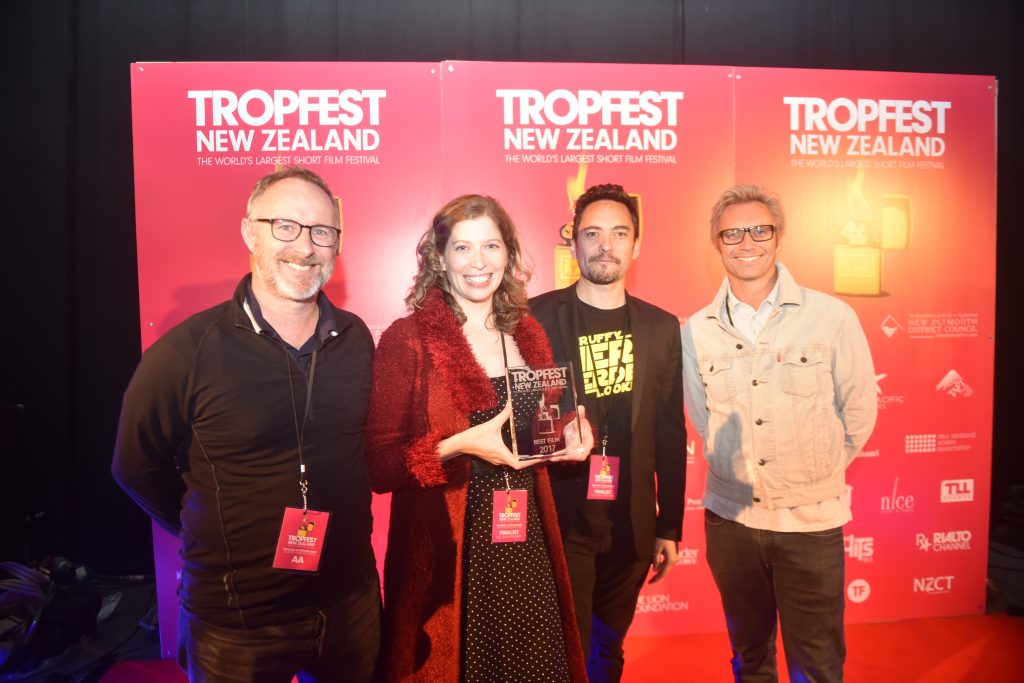It pays to wake-up to the “business” of show business
On the 18th of February, on a balmy evening in New Plymouth, a large audience gathered in a grassy outdoor amphitheater to enjoy sixteen short films from a new generation of New Zealand filmmakers. All were excited to be sharing their stories and talent through the hugely influential platform Tropfest.
Their focus that night, and no doubt throughout busy preceding months, was most likely concentrated on the “show” of show business – making the best possible films. During the lead-up they were bound to be thinking about how their films would be received by an audience. Indeed, how well their film fared in front of expert judges and a receptive crowd would likely serve as an indicator that their creative vision resonated, that their talent was evident. Success at Tropfest might signal their capacity to chisel out a career in one of the toughest industries going – film and television.
It was less likely that their attention was on copyright.
Granted, it’s not the sexiest of subjects. And yet, the management of intellectual property (IP) is at the core of the business known as “show business”. Yes, the successful monetization of your IP is the very thing that could enable you to build and sustain a career. Simply put, it pays to know this stuff. You needn’t be an expert, but even new and emerging filmmakers can benefit from understanding the basic business principles that underpin their industry.
As a filmmaker I’ve found myself pondering issues of IP as they relate to my projects and plans for the future. Not so long ago I was standing in the shoes of those nervous Tropfest filmmakers, hoping for the kind of recognition that would boost my career as a writer-director. The art of filmmaking is the thing that excites me most but I do recognise that filmmaking is a costly, industrial activity. It is empowering for artists to know how financing is put together and how revenues are distributed. Such knowledge helps you understand what producers are up against in a challenging, dynamic field. It helps you understand what you should seek and what you should surrender in the legal agreements into which you may enter.
The first thing to point out is that copyright cannot reside in an idea. Indeed, an unexpressed idea is worthless. What can be copyrighted is the tangible expression of an idea. The moment you write something down – or film or record it – you have created a property in which copyright can reside.
Sometimes producers hire writers to create screenplays, sometimes they acquire the rights to existing screenplays. Either way, they will need to establish or secure what’s known as “chain of title”. This means that if your write a screenplay your authorial copyright will most likely be transferred to a “special purpose vehicle” (SPV). This is simply a company established for the specific purpose of producing the film. It is likely that the SPV will be majority owned by the producer, but that’s okay. Ownership brings a number of responsibilities to financiers, insurers and assorted agencies. It’s probable you’re not going to want to deal with all of that ongoing administration and compliance. Besides, you can enjoy all kinds of entitlements (to fees, credits, a share of profits, etc.) without needing to retain ownership. Producers leverage their ownership of copyright to pull financing together.
The world of film financing is not static. Business models are evolving, fast. For decades countless films have been financed in part by pre-sales (or post-sales, as the case may be). Quite literally, this means that the rights holders (the producers) sell-off the rights to screen a film. Global rights are broken down into territories and platforms (theatrical, home video, pay television, free to air television, etc). In recent years the home video market has diminished, significantly. Meanwhile, the rise and rise of subscription video on demand (SVoD) has added considerable dynamism to this field. Major players such as Netflix and Amazon Prime are paying substantial sums to acquire films and make them available across multiple territories. In addition, they are pouring enormous resources into making their own content.
Another relatively recent development has been the advent of “day and date” releasing. It used to be the case that films were released gradually across the globe, but the advent of digital piracy demanded a new approach. These days most large so-called “tent pole” films tend to be released in cinemas in multiple territories on the same day and date. In New Zealand, perhaps coming as a surprise to many of you, a majority of major film titles are released as early as (or even earlier than) the U.S.
Piracy has been a significant challenge for the screen industry and combating it is one of the very important functions performed by the creative industries, working closely with governments and the technology sector. This is largely about protecting the integrity and value of your intellectual property.
Another trend to note. In recent years some enormous multi-nationals have grown fat on business models that have, to put it politely, failed to give copyright holders their due. (Yes, I’m looking at you, YouTube and Google.) These corporations tend to push for the erosion of copyright protection. They lobby governments, arguing that copyright stifles innovation. However, considerable evidence suggests that the contrary is true. Robust, modern copyright encourages innovation – indeed, it is the lifeblood of innovation.
There are many ways to keep abreast of industry debates and trends. You might subscribe to periodicals such as Screen International, Variety or The Hollywood Reporter, or check out industry blogs such as the Content Café – which offers up-to-date commentary on creative rights for filmmakers and other topics. At the very least, try to develop the habit of visiting the websites of these major industry periodicals, along with others such as imdb.com and deadline.com. Dedicate at least some of your time to following what’s occurring at the business end of the industry. I’d encourage you to seek out interviews with producers. Plenty are available online thanks to such bodies as the Producers Guild of America (PGA). Listen to producers talk about what attracted them to projects and how they put those projects together, the challenges they faced, etc. I recommend the Producers Roundtable series hosted online by The Hollywood Reporter. You might also seek out books by producers. Ted Hope’s Hope For Film is one of my favourites. All of this will help you gain insight into what drives the decisions made by producers and financiers. And, of course, this kind of perspective is bound to be helpful as you set about formulating and developing your own ideas.
Moving from global to personal considerations, what are your rights as a New Zealand filmmaker? Your rights in a film or television show may differ depending on your role – as a screenwriter, director, producer, actor or other crew member. These rights have been negotiated over many years. In some territories, writers and directors have negotiated what is called “authorship”. In some territories, opportunities exist to share automatically in residual payments via the sale or rental of the film or show in question. There is certainly a strong case that New Zealand writers and directors could improve their copyright and remuneration position in creative works. In this country directors are represented by the Directors and Editors Guild (DEGNZ), of which I am Vice President. This body is committed to the creative and financial well-being of directors and editors. We favour revision of our copyright laws and improved terms for directors – but law change can be a long, slow process.
Typically a director will be paid for their services during pre-production, production and post-production – and they’ll be required to participate in publicising the project. In addition, they may receive a percentage of the film’s net profits. Their contract with a producer will specify the type of credit they are to receive, who has final cut of the film, and so on. In some instances a director will be, in essence, a gun for hire, brought aboard a production that a producer has developed and financed. This is especially common in television production. In other instances, and this is fairly common in New Zealand, the director will also be a/the writer on a film project – in which case they’ll be compensated for performing both roles.
NZ screenwriters have copyright but NZ directors do not. Our screenwriters automatically enjoy a number of benefits and economic entitlements. It’s important to keep in mind that agreements with collaborators need to be managed, carefully. If you are working in partnership with another writer it is likely that person deserves a credit, a fee, profit participation, etc. Advice on such matters can be sought from the NZ Writers Guild (NZWG).
In addition to the NZWG and DEGNZ, other local bodies and guilds work on behalf of industry practitioners. These include the Screen Production and Development Agency (SPADA). It represents producers and hosts an annual conference. Fine work is done by Women in Film and Television (WIFT), Nga Aho Whakaari, the Screen Composers Guild of NZ, the NZ Cinematographers Society (NZCS), Actors Equity NZ, the Film and Video Technicians Guild, and Script to Screen, which runs an annual conference known as the Big Screen Symposium. Get along to the Symposium if you can. It’s always a terrific event with amazing networking opportunities and wonderfully accomplished speakers.
By all means, join one of the aforementioned bodies or guilds. There is strength in numbers and this is a terrific way to keep abreast of what’s happening within the local industry and within your particular discipline. Most of these organisations have student and associate membership rates, so it’s not necessarily expensive to join. Several have template contracts and agreements. They also administer professional development opportunities and may be able to provide you with advice from time to time. Some are unions (e.g. NZWG and Equity), others are not (e.g. DEGNZ). Even so, all are working to advance the interests of Kiwi filmmakers and to grow the local screen industry.
Hopefully these words have made you more inclined to investigate how astute IP management can benefit you. As you stride forward, generating stellar intellectual property, making and sharing your films with audiences, I wish you all the best for a long and rewarding career.
Back in New Plymouth, the judges’ announcement delighted two emerging filmmakers from Hamilton, Mary Rinaldi and Sasha Nixon. Their short film Anniversary – about an emotionally wounded couple using children’s games to deal with the loss of their daughter – won Best Film and Nga Aho Whakaari/Te Puni Kokiri Maori Creativity Award. The Motion Picture Association (MPA) and New Zealand Screen Association (NZSA) provide a five-day trip to Los Angeles for a film immersion course and meetings with agents, producers, entertainment lawyers and unions/guilds. This is bound to be a time when their attention will turn, for a moment at least, to the serious “business” of show business. Having participated in this immersion course in 2015, I know that they are in for an amazingly stimulating and edifying experience.
About the author: Gabriel Reid has held a range of roles in film, television and theatre production and promotion. He has held staff positions at Opera New Zealand and Television New Zealand. His M.A. thesis examined Shakespeare on film and his Ph.D. thesis examined the impact of digital technologies on film production. His work as a director has garnered Tropfest, Writers Guild and ProMax Australia awards along with NZ Film Awards nominations. He is Vice President of the Directors and Editors Guild of New Zealand.



